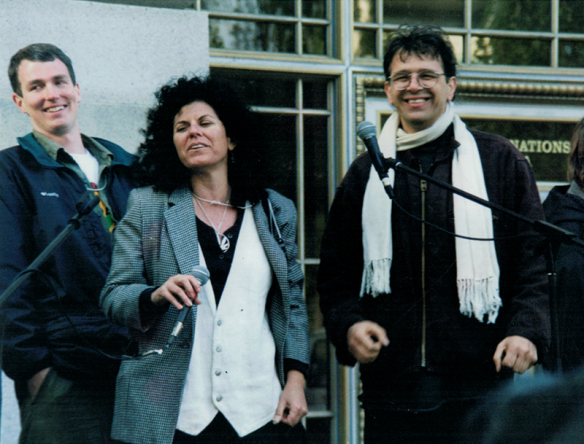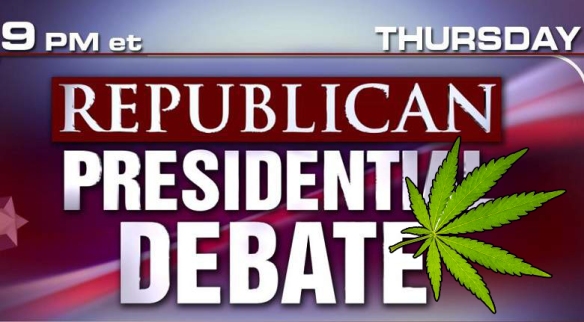
From right to left: Jeff Jones, Mikki Norris and Chris Conrad in mid to late 1990s
It’s been 20 years since the Oakland Cannabis Buyers Club (OCBC) set up shop in the heart of downtown Oakland. Jeff Jones, who now operates the Patient ID Center and who is an Oaksterdam University professor, was one of the pioneers who helped change the course of cannabis in the United States. Cannabis Industry Today sat down with Jones to remember what it was like two decades ago and to learn just how far the City of Oakland and the cannabis industry has changed since.
Cannabis Industry Today: What was Oakland like in 1995 and `96?
Jeff Jones: Very few people came downtown. It was largely vacant of businesses and still broken down from the earthquake that hit San Francisco, Oakland and Loma in 1989. Rent was cheap and parking on the street was readily available. When I opened OCBC, a patient could easily park right on the street and run in for a pickup.
Cannabis Industry Today: What motivated you to come to Oakland back then?
Jeff Jones: I watched my father suffer from cancer treatment, which is pretty impactful on a teenager. He died in 1988 in home hospice when I was 14 years old. That same year Federal Administrative Judge Francis L. Young had ruled that cannabis should be immediately rescheduled to allow research on its therapeutic benefits. Though I learned this later in my life, I was very frustrated that an alternative therapy could have helped my father but there had been no information about cannabis available or legal access to it for anyone. It wasn’t until I was in college that I heard about the Cannabis Action Network (CAN), which had a hemp booth at a Primus concert. Based in Oakland, CAN was a source of information about marijuana at a time when the government didn’t recognize any of the medicinal properties of cannabis. There I met Debby Goldsberry, who founded CAN, and others and got a crash course in cannabis activism and how to create change at a grassroots level.
Cannabis Industry Today: So you’re in Oakland and decide to start the OCBC. How did that come about and what happened?
Jeff Jones: I followed in the footsteps of cannabis advocates Dennis Peron and Brownie Mary, who were heavily involved in providing medical cannabis to AIDS patients in San Francisco in the early 1990s. The first time I ever saw any government official supporting cannabis at the time was when then Board of Supervisor Tom Ammiano participated in Dennis’s ribbon cutting ceremony for the San Francisco Cannabis Buyers Club.
In Oakland, I saw an opportunity to do something that could help the City and help patients who wanted and needed access to medical cannabis. But, I decided to go with a slightly altered model compared to Dennis—one that could become a model for others anywhere in the country.
OCBC was a bicycle delivery business and I worked with the City to create an official Resolution of Support, which passed in 1996. This allowed me to rent space and set up shop right on Broadway downtown and it made the City of Oakland the first U.S. city to contract with a medical cannabis provider. A task force of people from law enforcement, the city manager’s office, the city attorney’s office and the cannabis community came up with guidelines for how the police would handle people using marijuana and how to determine if there were using it recreationally or medically. That’s how the idea of a medical card came about.
There were no regulations in place for a cannabis business, so I self-regulated OCBC with the goal of being a respectable business and good neighbor. Cannabis wasn’t being taxed, but I paid taxes on cannabis sold through a bit of ‘smoke and mirrors’ method. Cannabis items were identified as pens, paper—items that were legally taxed—to ensure I paid taxes on goods sold by OCBC. Word-of-mouth news about OCBC grew and patients only received cannabis if they had a recommendation from a medical doctor. Many of the practices I implemented then became the tenants of Senate Bill 420 and the Attorney General Guidelines of 2008.
Cannabis Industry Today: How long did OCBC stay in operation?
Jeff Jones: Many city council members helped me legitimize my goal to bring medical cannabis to patients in Oakland. OCBC had operated for about two years before the U.S. Department of Justice sued us; the civil lawsuit caused us to close up the dispensary and to fight the battle in court and public opinion.
The case, which began in the U.S. District Court for the Northern District of California, was argued up to the U.S. Supreme Court and was the first case to ask the question for medical necessity patients. From the beginning I was not going to let the federal government call me a ‘drug dealer,’ and that focus and tenacity to continue was important. Without it I would not have been treated fairly.
“We experienced setbacks in the case, but I think we triggered a new feeling that not all marijuana cases filed lead to prison time–a battle that is still being waged throughout the country today–and the case created a discussion about states’ rights that has influenced cannabis legalization around the country.”
— Jeff Jones reflecting on U.S. Supreme Court case United States vs Oakland Cannabis Buyers Club and Jeffrey Jones
Cannabis Industry Today: Were you treated fairly?
Jeff Jones: I think so, yes. We experienced setbacks in the case, but I think we triggered a new feeling that not all marijuana cases filed lead to prison time—a battle that is still being waged throughout the country today—and the case created a discussion about states’ rights that has influenced cannabis legalization around the country. My experience has allowed me to share a cannabis business model…a regulation model…that is duplicable and acceptable around the country.
Cannabis Industry Today: How has Oakland changed since 1996?
Jeff Jones: Oakland offers the perfect example of how legal cannabis sales can be regulated and taxed and how it creates a positive economic impact. The cannabis industry helped seed change in Oakland and today the city is thriving. Oaksterdam University started here in 2007. The Fox Theater was renovated in 2009 and restaurants have opened all around it. The old Sears store is now being renovated into office space, hotels are going up and there are plans to revitalize Jack London Square, Old Town and Uptown.
The City continues to be open to change. In May, the Council voted to pass the Equity Permit Program, which allows recently incarcerated to be eligible for medical cannabis industry permits. It’s a unique move. Across the nation such convicted felons would be barred from entering the legal cannabis trade. What would make the Equity Program even better would be to also offer loans so these businesses could get set up…give them hope as well as ability.
Cannabis Industry Today: And, the cannabis industry?
Jeff Jones: We moved a mountain. There are lots of individuals who have made a difference. When I first started advocating for cannabis I thought change would happen faster, but it’s not that simple. I think a lie got started about cannabis and then more lies were added onto that original lie and that’s what people believed. A key turning point in the perception of cannabis came when Dr. Sanjay Gupta apologized on CNN for his original opinions about marijuana and released a documentary called “Weed.” Today support of cannabis legalization among Americans is outpacing opposition to it, 25 states have legal medical marijuana, and we are on the cusp of rescheduling cannabis. I’d say that’s pretty huge.











